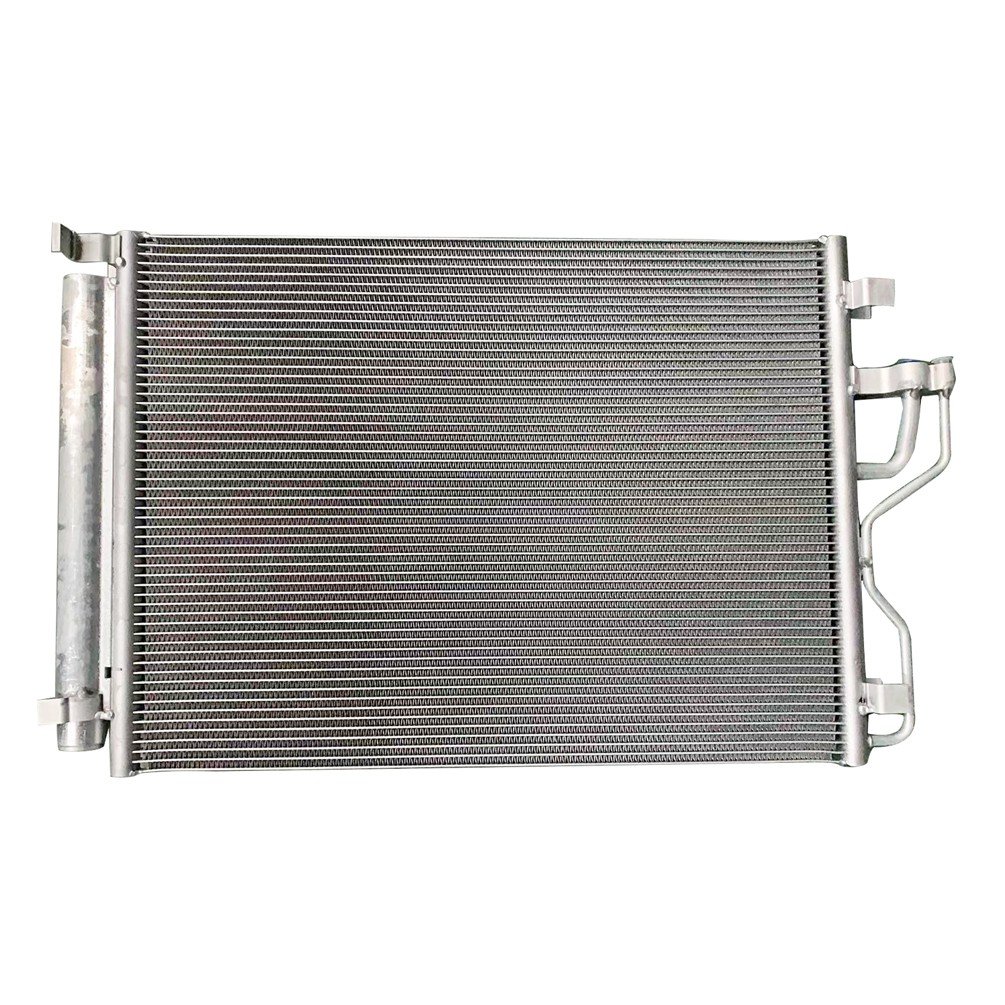What Causes Your Car’s AC to Lose Its Cool?
May 08, 2024
Table of Contents
Unveiling the Chilling Truth: Why Your Car's AC is Losing Its Cool
Your car's air conditioning system is a complex network of components that work together to keep you cool and comfortable on the road. But what happens when your AC starts to lose its cool? There are a number of potential causes, from simple leaks to more serious mechanical problems. In this article, we'll explore some of the most common reasons why your car's AC might not be working properly.
Condenser Issues

Condenser Issues: A Common Culprit for AC Malfunctions
Your car's air conditioning system is a crucial component for maintaining a comfortable driving experience, especially during hot summer months. However, when your AC starts to lose its cool, it can be a frustrating and uncomfortable situation. One of the most common causes of AC failure is condenser issues.
The condenser is a vital part of the AC system, responsible for dissipating heat from the refrigerant. It is typically located in front of the radiator and consists of a series of tubes and fins. When the condenser becomes clogged or damaged, it can restrict the flow of refrigerant and prevent the AC from cooling effectively.
Clogged Condensers: A Silent Culprit
Over time, dirt, debris, and road grime can accumulate on the condenser's surface, blocking the airflow and reducing its ability to dissipate heat. This gradual clogging can go unnoticed until the AC system starts to struggle to cool the cabin. Regular cleaning of the condenser can help prevent this issue and ensure optimal performance.
Damaged Condensers: A More Serious Problem
In some cases, the condenser may become damaged due to external factors such as road hazards or collisions. Physical damage can cause leaks in the condenser, allowing refrigerant to escape. This can lead to a significant loss of cooling capacity and may require professional repair or replacement.
Signs of Condenser Issues
If you suspect that your car's AC is not performing as it should, there are a few telltale signs to look for:
- Weak or no airflow from the vents
- Warm or lukewarm air blowing from the vents
- Unusual noises or vibrations coming from the AC system
- Visible damage or debris on the condenser
Addressing Condenser Issues
If you experience any of these symptoms, it is important to have your car's AC system inspected by a qualified mechanic. They can diagnose the issue and determine if the condenser is the culprit. Depending on the severity of the problem, the mechanic may recommend cleaning, repairing, or replacing the condenser to restore the AC's cooling capacity.
Regular maintenance and timely repairs can help prevent condenser issues and ensure that your car's AC system continues to provide you with a cool and comfortable driving experience.
Compressor Failure
**What Causes Your Car's AC to Lose Its Cool?**
When the summer heat intensifies, a functioning air conditioning system in your car becomes indispensable. However, if your AC suddenly stops blowing cold air, it can be a frustrating and uncomfortable experience. One of the most common culprits behind this issue is compressor failure.
The compressor is the heart of your car's AC system. It compresses refrigerant gas, increasing its pressure and temperature. This high-pressure gas then flows through the condenser, where it releases heat and condenses into a liquid. The liquid refrigerant then passes through the expansion valve, which reduces its pressure and temperature, causing it to evaporate. This evaporation process absorbs heat from the air inside your car, cooling it down.
Compressor failure can occur for various reasons. One common cause is a refrigerant leak. Refrigerant is a vital component of the AC system, and its loss can lead to a drop in pressure, causing the compressor to overheat and eventually fail. Leaks can occur due to damaged hoses, seals, or the evaporator core.
Another potential cause of compressor failure is electrical problems. The compressor is powered by an electric motor, and any issues with the motor or its electrical connections can prevent the compressor from functioning properly. Electrical problems can arise from faulty wiring, blown fuses, or a malfunctioning control module.
In some cases, compressor failure can also be caused by mechanical issues. The compressor contains moving parts, such as pistons and bearings, which can wear out over time. Excessive wear and tear can lead to reduced efficiency, increased noise, and eventual failure.
If you suspect that your car's AC compressor has failed, it's important to seek professional assistance promptly. A qualified mechanic can diagnose the problem accurately and recommend the appropriate repairs. Ignoring a failing compressor can lead to further damage to the AC system and other components of your car.
To prevent compressor failure, it's essential to maintain your car's AC system regularly. This includes checking refrigerant levels, inspecting hoses and seals for leaks, and having the system serviced by a qualified technician. By following these maintenance practices, you can help ensure that your car's AC remains in optimal condition, providing you with cool and comfortable rides during the hot summer months.
Refrigerant Leaks
**What Causes Your Car's AC to Lose Its Cool?**
When the summer heat intensifies, a functioning air conditioning system in your car becomes indispensable. However, if your AC suddenly loses its cooling power, it can be a frustrating and uncomfortable experience. One of the most common reasons for this loss of cooling is refrigerant leaks.
Refrigerant, also known as Freon, is a vital component of your car's AC system. It circulates through the system, absorbing heat from the cabin and releasing it outside. Over time, however, refrigerant can leak out due to various factors.
One common cause of refrigerant leaks is corrosion. The AC system's components, such as the condenser and evaporator, are exposed to moisture and road salt, which can cause them to corrode. This corrosion can create small holes or cracks, allowing refrigerant to escape.
Another potential cause of leaks is loose or damaged fittings. The AC system consists of numerous hoses and connections that can become loose or damaged over time. This can result in refrigerant leaking out at the points of connection.
In addition, physical damage to the AC system can also lead to refrigerant leaks. For instance, if you hit a curb or encounter a road hazard, it can puncture or damage the condenser or other components, causing refrigerant to leak out.
When refrigerant levels drop, the AC system's ability to cool the cabin is compromised. You may notice a decrease in cooling performance, or the AC may stop working altogether. Additionally, you may hear unusual noises, such as hissing or gurgling, coming from the AC system.
If you suspect a refrigerant leak, it's crucial to have your car inspected by a qualified mechanic as soon as possible. They can use specialized equipment to detect leaks and determine the source of the problem. Repairing refrigerant leaks typically involves replacing damaged components or tightening loose fittings.
To prevent refrigerant leaks, it's important to have your AC system serviced regularly. A mechanic can inspect the system for any signs of corrosion or damage and ensure that all fittings are secure. Additionally, avoiding driving over rough terrain or hitting curbs can help minimize the risk of physical damage to the AC system.
By understanding the causes of refrigerant leaks and taking preventive measures, you can keep your car's AC system functioning optimally, ensuring a comfortable and cool ride during the hot summer months.
Bad Cooling Fans
**What Causes Your Car's AC to Lose Its Cool?**
When the summer heat intensifies, a functioning air conditioning system in your car becomes indispensable. However, if your AC starts blowing warm air, it can be a frustrating and uncomfortable experience. One of the potential culprits behind this issue is malfunctioning cooling fans.
Cooling fans play a crucial role in the AC system by dissipating heat from the condenser. The condenser is responsible for converting the refrigerant from a gas to a liquid, releasing heat in the process. The cooling fans draw air through the condenser, carrying away this heat and preventing the system from overheating.
If the cooling fans fail or become inefficient, the condenser cannot effectively release heat. As a result, the refrigerant pressure increases, causing the AC system to shut down as a safety measure. This leads to the AC blowing warm air instead of cool air.
There are several reasons why cooling fans may malfunction. One common cause is electrical issues, such as a blown fuse or a faulty wiring harness. Another potential issue is mechanical problems, such as a seized fan motor or damaged fan blades. Additionally, debris or dirt accumulation on the fans can impede their airflow, reducing their cooling capacity.
Diagnosing a cooling fan issue can be relatively straightforward. If you notice that your AC is blowing warm air, check if the cooling fans are operating. You can usually hear the fans running when the AC is turned on. If the fans are not running, inspect the electrical connections and fuses to identify any potential problems.
If the electrical connections and fuses appear to be in order, the issue may lie with the fan motor or blades. You can try manually spinning the fan blades to check for any resistance or damage. If the blades are damaged or the motor is seized, the fan will need to be replaced.
To prevent cooling fan issues, it is important to maintain your car's AC system regularly. This includes cleaning the condenser and fan blades to remove any debris or dirt accumulation. Additionally, having the AC system inspected and serviced by a qualified mechanic can help identify and address potential problems before they become major issues.
By understanding the role of cooling fans in your car's AC system and the potential causes of their malfunction, you can take proactive steps to ensure that your AC remains in optimal condition, providing you with a cool and comfortable ride during the hot summer months.
Electrical Issues
**What Causes Your Car's AC to Lose Its Cool?**
When the summer heat intensifies, a functioning air conditioning system in your car becomes indispensable. However, if your AC suddenly stops blowing cold air, it can be a frustrating and uncomfortable experience. Understanding the potential causes behind this issue can help you diagnose and resolve it promptly.
One common culprit is a refrigerant leak. Refrigerant is the lifeblood of an AC system, absorbing heat from the cabin and releasing it outside. A leak can occur anywhere in the system, from the compressor to the condenser or evaporator. If the refrigerant level drops below a certain point, the AC will cease to function effectively.
Another potential cause is a faulty compressor. The compressor is the heart of the AC system, responsible for circulating the refrigerant. If the compressor fails, the refrigerant cannot be circulated, and the AC will not produce cold air.
Electrical issues can also lead to AC problems. A faulty AC relay or fuse can prevent the compressor from receiving power, resulting in a loss of cooling. Additionally, a malfunctioning blower motor or fan can hinder the circulation of cold air throughout the cabin.
In some cases, a clogged or dirty condenser can be the culprit. The condenser is located in front of the radiator and helps dissipate heat from the refrigerant. If it becomes clogged with dirt or debris, it can reduce the AC's efficiency and lead to a loss of cooling.
Finally, a faulty expansion valve can also cause AC problems. The expansion valve regulates the flow of refrigerant into the evaporator. If it malfunctions, the refrigerant may not be able to expand properly, resulting in a decrease in cooling capacity.
If you suspect that your car's AC has lost its cool, it is important to have it diagnosed by a qualified mechanic. They can pinpoint the exact cause of the issue and recommend the appropriate repairs. Ignoring AC problems can lead to further damage and discomfort, especially during hot weather.
By understanding the potential causes of AC failure, you can be better prepared to address the issue and restore the comfort of your vehicle's interior.
Bad Clutch Cycling Switch
**What Causes Your Car's AC to Lose Its Cool?**
When the summer heat intensifies, a functioning air conditioning system in your car becomes indispensable. However, if your AC suddenly stops blowing cold air, it can be a frustrating and uncomfortable experience. One potential culprit behind this issue is a faulty clutch cycling switch.
The clutch cycling switch is a crucial component in the AC system. It controls the engagement and disengagement of the compressor clutch, which drives the compressor that circulates refrigerant throughout the system. When the AC is turned on, the switch sends a signal to the compressor clutch, engaging it and allowing the compressor to operate.
However, if the clutch cycling switch malfunctions, it can disrupt the proper functioning of the AC system. A faulty switch may fail to engage the compressor clutch, preventing the compressor from operating and thus resulting in a lack of cold air. Conversely, it may also fail to disengage the clutch, causing the compressor to run continuously, which can lead to overheating and damage to the system.
Diagnosing a faulty clutch cycling switch can be challenging, as the symptoms can mimic other AC issues. However, a qualified mechanic can perform tests to determine if the switch is the root cause of the problem. If the switch is found to be defective, it will need to be replaced.
Replacing the clutch cycling switch is a relatively straightforward repair. The mechanic will disconnect the electrical connector and remove the old switch. The new switch will then be installed and the electrical connector reconnected. Once the replacement is complete, the AC system should be recharged with refrigerant to ensure optimal performance.
To prevent future issues with the clutch cycling switch, it is important to have your car's AC system serviced regularly. A qualified mechanic can inspect the switch and other components of the system, ensuring that they are functioning properly and preventing potential problems from developing.
By understanding the role of the clutch cycling switch and its potential impact on your car's AC system, you can be better equipped to address any issues that may arise. Regular maintenance and prompt repairs can help keep your AC running smoothly and provide you with a comfortable driving experience, even during the hottest summer days.**Conclusion:**
Maintaining a cool and comfortable cabin during hot weather is crucial for a pleasant driving experience. However, when a car's AC system fails to deliver, it can be a major inconvenience. Understanding the common causes of AC failure, such as refrigerant leaks, compressor issues, condenser problems, and electrical malfunctions, is essential for timely diagnosis and repair. Regular maintenance, including AC system inspections and refrigerant recharges, can help prevent AC failures and ensure optimal performance throughout the summer months.





